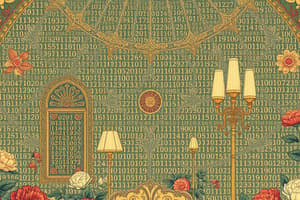Podcast
Questions and Answers
What is the definition of a computer?
What is the definition of a computer?
An electronic, programmable device that gathers data, stores it, processes it in accordance with human commands, and outputs the outcome.
Match the following generations of computers with their characteristics:
Match the following generations of computers with their characteristics:
1st Generation = Used vacuum tubes, large space, consumed a lot of electricity 2nd Generation = Built using transistors, smaller, cheaper 3rd Generation = Built with integrated circuits, introduced keyboard and mouse 4th Generation = Era of VLSI, integrated thousands of circuits in a small chip 5th Generation = Era of ULSI and artificial intelligence
Which of the following are advantages of computers? (Select all that apply)
Which of the following are advantages of computers? (Select all that apply)
- Creates dependency
- Massive storage capability (correct)
- Improved productivity (correct)
- Cost effective (correct)
Cybercrimes are an advantage of computers.
Cybercrimes are an advantage of computers.
What is the primary function of digital computers?
What is the primary function of digital computers?
The ______ generation of computers is characterized by artificial intelligence and ULSI technology.
The ______ generation of computers is characterized by artificial intelligence and ULSI technology.
What is an analog computer designed to process?
What is an analog computer designed to process?
Flashcards are hidden until you start studying
Study Notes
Target Outcomes
- Understand different sizes of computers
- Recognize societal advantages and disadvantages of computers
- Classify computers based on the type of data they handle
- Evaluate computer impact on society
Definition of a Computer
- Originates from the term referring to someone who computes
- Modern definition: electronic, programmable device for data gathering, storage, processing, and output
- Performs arithmetic and logical operations automatically via user-provided instructions
Evolution of Computers
- Evolved from simple machines to complex systems capable of multi-tasking at high speeds
Advantages of Computers
- Increased productivity: faster processing, time saving, enhanced accuracy
- Massive storage capability
- Improved connectivity across networks
- Enhanced security measures
- Cost-effective solutions for various applications
- Acts as a learning assistant
- Creates employment opportunities in tech-related fields
Disadvantages of Computers
- Improper usage leading to negative consequences
- Vulnerabilities to cybercrimes (hacking, phishing, etc.)
- Can foster dependency among users
- Environmental impact from e-waste
- Potential health issues linked to prolonged use
- Threats to privacy due to data exposure
- Risk of reduced social interaction
- Possible contributions to unemployment in traditional job sectors
Generations of Computers
- 1st Generation (1940-56): Utilized vacuum tubes, magnetic drums; required large space, high electricity consumption, and prone to overheating
- 2nd Generation (1956-63): Introduced transistors; smaller, faster, more affordable, and energy-efficient
- 3rd Generation (1964-71): Used integrated circuits (IC); first desktops with keyboard and mouse, significantly smaller and faster
- 4th Generation (1972-1980): VLSI technology incorporated thousands of circuits in small chips; emergence of personal computers by IBM and Apple
- 5th Generation (1980-present): Focus on ULSI and artificial intelligence; includes advancements in voice and speech recognition
Classifications of Computers
-
Based on Handling Capability/Size*
-
Analog Computers
- Designed for processing continuously changing data (e.g., speed, temperature)
- Directly processes data without conversion into numbers
- Displays results in real-time; beneficial for instantaneous operations
- Advantages: Simple, graphical display; real-time results
- Disadvantages: High power consumption, limited storage capacity
- Examples: Speedometer, Analog Clock, Voltmeter
-
Digital Computers
- Engineered for high-speed calculations using binary data (0s and 1s)
- Processes raw data through stored instructions and outputs results
- Includes common devices like laptops, desktops, and smartphones
- Advantages: Simple storage and retrieval of information; adaptability for multiple applications without extensive changes
Studying That Suits You
Use AI to generate personalized quizzes and flashcards to suit your learning preferences.




